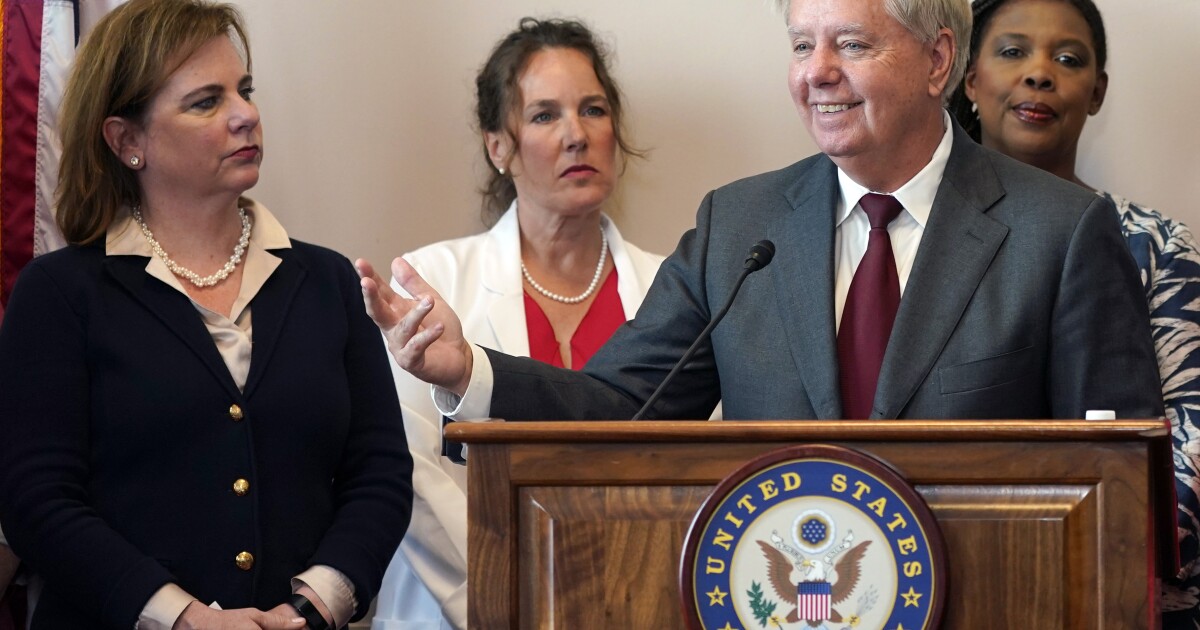

Five decades of Republican unity in opposition to abortion rights have collapsed into discord and indecision as the party struggles to reach a consensus and find a winning message on an issue poised to influence crucial midterm elections.
Divisions are playing out in states controlled by Republicans, with some enacting stringent abortion bans with minimal exceptions and others opting for moderate restrictions that include popular carve-outs for rape and incest. Fissures have also emerged on the campaign trail and on Capitol Hill. Some prominent Republicans are demanding legislation banning abortion nationally, Sen. Lindsey Graham (R-SC) among them. Others, especially those on the ballot in key battlegrounds, want the matter left to the states.
This dissension has put Republicans on the defensive heading into November, jeopardizing their ability to maximize gains and win governing majorities in the House and Senate.
“Republicans have always had an advantage on the issue of courts, but the Dobbs decision moves abortion from a political issue in theory to an issue in practice,” said Doug Heye, a GOP strategist in Washington. “Trigger laws and other bills only heighten that and threaten Republican gains.”
For two generations following the Supreme Court’s 1973 ruling in Roe v. Wade, which established a constitutional right to an abortion, most Republicans declared allegiance to the “pro-life” banner. It was a unifying catchall that papered over nuanced, intraparty differences on among the most polarizing issues in American politics.
In late June, when the Supreme Court eliminated federal protections for abortion rights with Dobbs v. Jackson Women’s Health Organization, Republicans were suddenly empowered to govern as “pro-life” politicians. This jarring reversal has revealed stark divisions on the issue and strategic uncertainty over what to do next.
SCHUMER TRANSFERRING $15 MILLION TO BOOST SENATE CANDIDATES AHEAD OF MIDTERM ELECTIONS
“This is a difficult topic to message,” said Barrett Marson, a Republican operative in Arizona, a swing state with closely watched fall contests for several offices, including governor and Senate. In the race against Sen. Mark Kelly (D-AZ), Republican nominee Blake Masters has worked overtime since the Aug. 2 primary to recast his abortion message with more “reasonable” language. “It surprises me that Republicans writ large haven’t settled on a position,” Marson said.
Republicans in another swing state, New Hampshire, have appeared similarly cautious. In the final days before Tuesday’s Democratic and GOP primaries in the Granite State, some of the top Republican congressional candidates hesitated to specify their position on abortion despite having an easy answer readily available.
Under self-described “pro-choice” Republican Gov. Chris Sununu and a Republican-controlled legislature, New Hampshire outlawed abortion in the final three months of pregnancy, preserving the right to access the procedure in instances of rape, incest, or adverse effects on the mother’s health. Sununu is proud of the law. Indeed, it represents a policy of “reasonable restrictions” many Republican strategists are convinced would put Democrats on the defensive (most Democrats support blanket abortion rights at all stages of pregnancy).
Yet rather than embrace the law of their state, some top New Hampshire Republicans running for the House equivocated on the issue when interviewed by reporters — or said the statute does not go far enough.
“I’ve been very clear on my position on abortion. I am a proud, pro-life woman, and I applaud our legislature for taking a great first step, but I do believe it could be taken a step further,” said Karoline Leavitt, who won the GOP nomination in New Hampshire’s 1st Congressional District. How much further? Which steps? Leavitt, who is challenging Rep. Chris Pappas (D-NH), did not say.
Matt Mowers, who finished second to Leavitt in that primary, was similarly coy when asked the same question about New Hampshire’s abortion law. “I’m pro-life,” he said. Pressed on whether he is satisfied with New Hampshire law, Mowers reiterated: “I’m pro-life,” adding, “I think there’s always more work we can do to bring about that culture of life.”
Notably, GOP Senate nominee Don Bolduc said he is perfectly content with New Hampshire’s abortion law and did not hesitate to say so to reporters a few days before winning the primary. Bolduc, a retired Army brigadier general challenging Sen. Maggie Hassan (D-NH), has a history of making controversial statements, and the Democrats consider him politically extreme.
“I am comfortable with what the Granite State did in the Legislature because it was consistent with what a majority of Granite Staters feel about it,” Bolduc said. “Women on both sides of this issue will be better heard at the state level than they ever would at the federal level.”
CLICK HERE TO READ MORE FROM THE WASHINGTON EXAMINER
The Democrats, meanwhile, have been energized no matter what approach Republicans take, whether strict bans at conception with exceptions only for the mother’s health, such as in deep-red Oklahoma, or relaxed prohibitions, such as in New Hampshire. The issue has helped Democrats balance the political scales, at least somewhat, with Republicans.
The GOP has an advantage with voters on a range of priority issues, from inflation to crime to border security. Abortion has allowed Democrats to cut into what had been a yawning gap in the GOP’s favor on voter enthusiasm, a key metric that is often determinative in midterm elections. That is why the issue is now front and center in Democratic campaigns.
“No matter how hard candidates try to hide their own extreme positions or scrub their websites, voters will know that if elected, a Republican majority will pass a nationwide abortion ban,” Helen Kalla, spokeswoman for the Democratic Congressional Campaign Committee, said in a statement.







